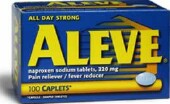- Recognizing the Signs of Hypothyroidism
- 10 Strategies to Overcome Insomnia
- Could Artificial Sweeteners Be Aging the Brain Faster?
- Techniques for Soothing Your Nervous System
- Does the Water in Your House Smell Funny? Here’s Why
- Can a Daily Dose of Apple Cider Vinegar Actually Aid Weight Loss?
- 6 Health Beverages That Can Actually Spike Your Blood Sugar
- Treatment Options for Social Anxiety Disorder
- Understanding the Connection Between Anxiety and Depression
- How Daily Prunes Can Influence Cholesterol and Inflammation
FDA Advisers Revisit Heart Risks Posed by Painkillers


Naproxen — the key pain reliever in Aleve — seems safer for the heart than other popular anti-inflammatory drugs such as ibuprofen (Advil and Motrin), U.S. health officials say.
And it’s possible that labeling will soon reflect that finding.
Advisers to the U.S. Food and Drug Administration are meeting Monday and Tuesday to discuss cardiac risks associated with non-steroidal anti-inflammatory drugs, sometimes called NSAIDs.
Millions of people take these medicines, which also include the prescription drug Celebrex, to relieve muscle aches, headaches and pain from arthritis and injuries.
Since 2005, labeling laws have required a heart warning on these anti-inflammatory drugs. That stemmed from Merck’s withdrawal of the NSAID Vioxx from the market in 2004 because of a notable increased risk of heart attack among Vioxx users.
But naproxen doesn’t seem to carry the same risks as the other NSAIDs, an FDA panel recently concluded after a safety review involving 350,000 people using different pain relievers. The panel posted its findings online last week.
If the FDA does approve a labeling change, that could make Aleve and other naproxen-containing drugs the preferred drug for patients who have a risk of heart problems, Ira Loss, a pharmaceutical analyst with Washington Analysis, told the Associated Press. However, all NSAIDs will still need to warn of risks for internal bleeding and ulceration, Loss said.
The FDA isn’t required to follow its advisory panel’s recommendations, but it frequently does.
Aspirin, another type of NSAID, isn’t a focus of this week’s hearings.
More information
The American College of Rheumatology has more about pain relievers.
Source: HealthDay
Copyright © 2026 HealthDay. All rights reserved.










